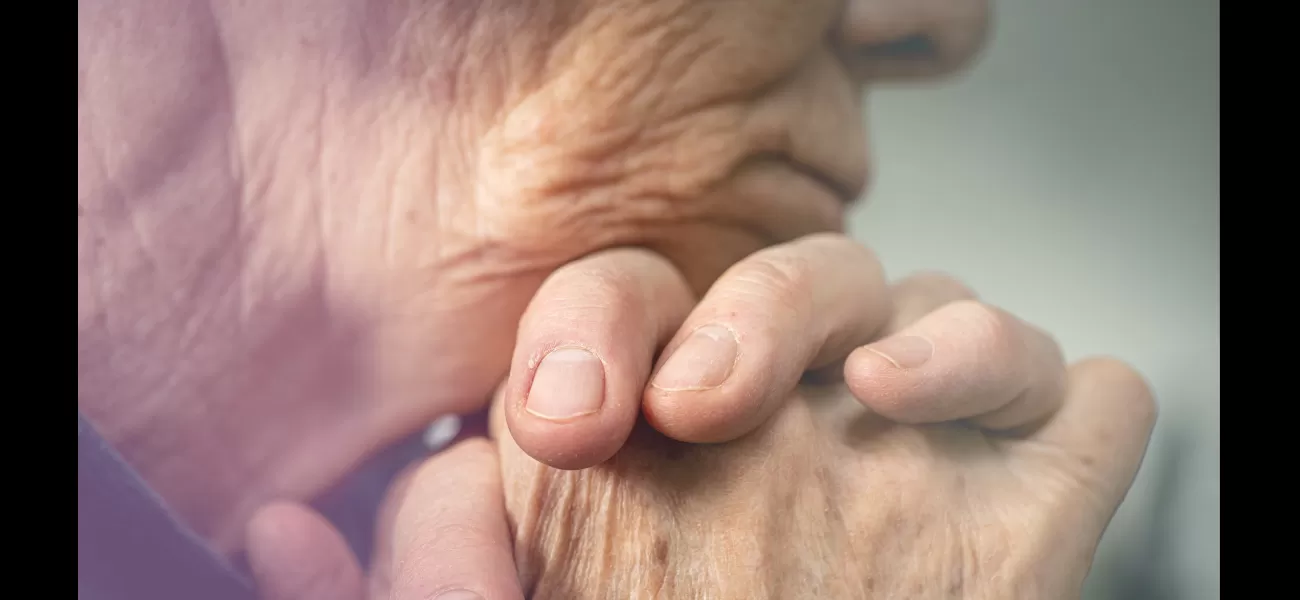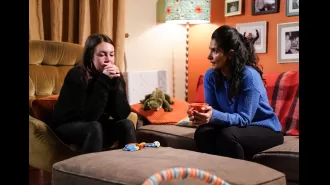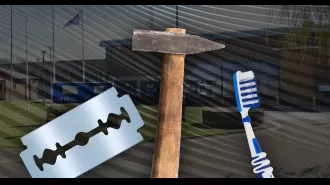Nan took her revenge on her ungrateful grandkids even after she had passed away.
I encouraged them to make the decision that was best for them, and they did it the next week.
May 22nd 2024.

My nan was the most incredible woman I had ever known. She was sweet and tiny, yet incredibly tough. I remember sitting in her warm living room in 2019, watching a single tear roll down her face, and feeling my heart ache. I had temporarily moved back to the UK after being abroad and was staying with her. The room smelled of her homemade shepherd's pie, a dish she cooked for me often despite her arthritic hands and ailing legs. I would watch as she stood at the stove, peeling potatoes and stirring the gravy, her glasses steaming up every time she opened the oven. But she never once complained or cursed, she just carried on with her task, determined to feed her loved ones.
She would cook this dish for all of her grandchildren, except for two. And that was the reason for her tears. These two grandchildren, who were estranged from our family, would only visit once a year, on the birthdays of their own children - my nan's great-grandchildren. They would pick up the presents and exchange forced pleasantries before leaving. It broke my heart to see my nan's pain as she counted the months and weeks since she last saw them. Despite this, she never spoke a bad word about them and simply accepted that this was how things were.
As the years went by, even these annual visits stopped and she never saw them again. I couldn't understand how they could be so cruel, especially after losing three of her four adult sons, one of them being my father. She had outlived most of her family, and seeing an elderly mother mourn her sons was heart-wrenching. But to then witness her own grandchildren exclude her from their lives was beyond sad.
My nan was a gentle maternal force in my life. She worked in a greasy spoon cafe until she was almost 80, and I would often go there to eat. But she would never let me pay, and we would argue as I tried to leave money on the table. I would always find it tucked into my back pocket on the bus ride home, a love letter with a regal illustration.
We were incredibly close, she was like a second mother to me. Every year, I would take her to see a different musical in London's West End. She would use the money she earned from serving breakfasts to buy a new outfit for our trip. As she got older and needed a wheelchair, I would push her around the city and we would make a day of it. We would stroll along the Thames, chatting and laughing. I even took her to Old Compton Street, explaining that it was "that gay street where I go out". When I came out to her as gay as a teenager, she did her best to understand with gentle questions and reassured me of her unconditional love. And in the years that followed, she welcomed every boyfriend with open arms, treating them as if they were her own grandchildren.
But it wasn't just my cousins who made my nan cry. When I told her in 2012 that I was moving to Australia, she could barely speak. Her tears fell as she struggled to say, "As long as you are happy". It was a bittersweet moment, as we both knew that I was moving far away and we would see each other less often. But we made a promise to keep in touch, and I would make the journey back to the UK every year to take her to the West End, and we would talk on FaceTime in between.
In 2019, she made the journey to Australia on her own, at the age of 83, and stayed with me for three weeks. We hugged koalas and I took her under the Harbour Bridge. I couldn't replace the sons she had lost, but during that trip, our bond reached a new level. As we grieved together over my father's sudden death, I became more than just her grandson, I became a surrogate son. She confided in me and shared things she had never told anyone else.
However, the wound of her estranged grandchildren still remained. After all the grief and loss she had experienced, she was heartbroken at the thought of missing out on seeing her great-grandchildren grow up. And so, in a brave act of self-care, she made the decision to write them out of her will.
After she told me, I was careful not to influence her decision. I simply told her to do what was best for her. And the following week, it was done. Surprisingly, her tears became less frequent. It was as if the act of disinheritance had ended her pain and given her a sense of empowerment. But it was still a sad and difficult decision for her to make.
After staying with my nan for six months in the UK in 2019, it was time for me to return to my new home in Sydney. Saying goodbye was always hard, but this time it felt almost unbearable. We hugged and cried, knowing that it would be a while before we saw each other again. As I headed to the airport, I received a message from her neighbor saying that my nan had been taken to the hospital. She had become so upset and worked up about my leaving that her heart couldn't handle the strain. I asked if I should come back, but they assured me that they were taking care of her. I boarded my flight, tears streaming down my face, and flew back to Australia.
Unfortunately, my nan never left that hospital. She passed away shortly after I returned to Sydney. Two weeks after flying to Australia, I was back on a plane, this time flying 24 hours to deliver her eulogy. My cousins who were written out of her will didn't attend her funeral, despite living only 30 minutes away. I couldn't believe that I had flown all that way to pay my last respects, while they couldn't even make the short journey.
I have never seen or spoken to them since they stopped seeing my nan, so I don't know how they felt when they found out they had been disinherited. But I can't help but feel sorry for them. They didn't just miss out on money, they missed out on the love that my nan had to offer.
The lesson here is to visit your grandparents, not because you want to be in their will, but because they need to know that you love them. And if you have experienced estrangement in your own family, know that it comes in many forms and it's important to give a voice to those who have been through it. If you have a story you would like to share, please reach out. Let's break the silence and talk about the complexities of estrangement.
She would cook this dish for all of her grandchildren, except for two. And that was the reason for her tears. These two grandchildren, who were estranged from our family, would only visit once a year, on the birthdays of their own children - my nan's great-grandchildren. They would pick up the presents and exchange forced pleasantries before leaving. It broke my heart to see my nan's pain as she counted the months and weeks since she last saw them. Despite this, she never spoke a bad word about them and simply accepted that this was how things were.
As the years went by, even these annual visits stopped and she never saw them again. I couldn't understand how they could be so cruel, especially after losing three of her four adult sons, one of them being my father. She had outlived most of her family, and seeing an elderly mother mourn her sons was heart-wrenching. But to then witness her own grandchildren exclude her from their lives was beyond sad.
My nan was a gentle maternal force in my life. She worked in a greasy spoon cafe until she was almost 80, and I would often go there to eat. But she would never let me pay, and we would argue as I tried to leave money on the table. I would always find it tucked into my back pocket on the bus ride home, a love letter with a regal illustration.
We were incredibly close, she was like a second mother to me. Every year, I would take her to see a different musical in London's West End. She would use the money she earned from serving breakfasts to buy a new outfit for our trip. As she got older and needed a wheelchair, I would push her around the city and we would make a day of it. We would stroll along the Thames, chatting and laughing. I even took her to Old Compton Street, explaining that it was "that gay street where I go out". When I came out to her as gay as a teenager, she did her best to understand with gentle questions and reassured me of her unconditional love. And in the years that followed, she welcomed every boyfriend with open arms, treating them as if they were her own grandchildren.
But it wasn't just my cousins who made my nan cry. When I told her in 2012 that I was moving to Australia, she could barely speak. Her tears fell as she struggled to say, "As long as you are happy". It was a bittersweet moment, as we both knew that I was moving far away and we would see each other less often. But we made a promise to keep in touch, and I would make the journey back to the UK every year to take her to the West End, and we would talk on FaceTime in between.
In 2019, she made the journey to Australia on her own, at the age of 83, and stayed with me for three weeks. We hugged koalas and I took her under the Harbour Bridge. I couldn't replace the sons she had lost, but during that trip, our bond reached a new level. As we grieved together over my father's sudden death, I became more than just her grandson, I became a surrogate son. She confided in me and shared things she had never told anyone else.
However, the wound of her estranged grandchildren still remained. After all the grief and loss she had experienced, she was heartbroken at the thought of missing out on seeing her great-grandchildren grow up. And so, in a brave act of self-care, she made the decision to write them out of her will.
After she told me, I was careful not to influence her decision. I simply told her to do what was best for her. And the following week, it was done. Surprisingly, her tears became less frequent. It was as if the act of disinheritance had ended her pain and given her a sense of empowerment. But it was still a sad and difficult decision for her to make.
After staying with my nan for six months in the UK in 2019, it was time for me to return to my new home in Sydney. Saying goodbye was always hard, but this time it felt almost unbearable. We hugged and cried, knowing that it would be a while before we saw each other again. As I headed to the airport, I received a message from her neighbor saying that my nan had been taken to the hospital. She had become so upset and worked up about my leaving that her heart couldn't handle the strain. I asked if I should come back, but they assured me that they were taking care of her. I boarded my flight, tears streaming down my face, and flew back to Australia.
Unfortunately, my nan never left that hospital. She passed away shortly after I returned to Sydney. Two weeks after flying to Australia, I was back on a plane, this time flying 24 hours to deliver her eulogy. My cousins who were written out of her will didn't attend her funeral, despite living only 30 minutes away. I couldn't believe that I had flown all that way to pay my last respects, while they couldn't even make the short journey.
I have never seen or spoken to them since they stopped seeing my nan, so I don't know how they felt when they found out they had been disinherited. But I can't help but feel sorry for them. They didn't just miss out on money, they missed out on the love that my nan had to offer.
The lesson here is to visit your grandparents, not because you want to be in their will, but because they need to know that you love them. And if you have experienced estrangement in your own family, know that it comes in many forms and it's important to give a voice to those who have been through it. If you have a story you would like to share, please reach out. Let's break the silence and talk about the complexities of estrangement.
[This article has been trending online recently and has been generated with AI. Your feed is customized.]
[Generative AI is experimental.]
0
0
Submit Comment





